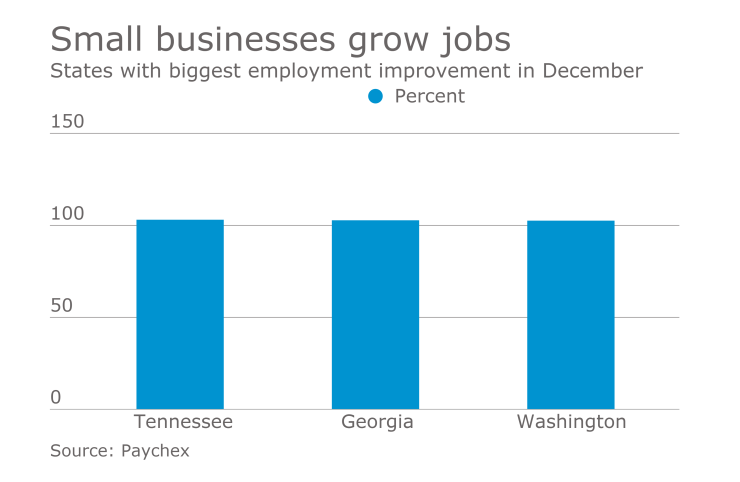Small business employment growth bounced back last month, according to payroll giant Paychex.
The
The Paychex | IHS Small Business Jobs Index grew 0.10 percent in December to 100.49, reversing three consecutive months of declines. Small business employment growth ended the year 0.12 percent higher than the same period in December 2015, despite some ups and downs over the course of last year.
“We have typically seen the number go down at the end of the year on a month-over-month basis, so we were pleasantly surprised to see that,” said Paychex senior director of risk management Frank Fiorille.
The East South Central part of the country continued to experience the strongest growth among regions, increasing 3.02 percent from last year. Tennessee surpassed Georgia as the top-ranked state for small business jobs. After nine months as the top metropolitan area on the index, Seattle was overtaken by Atlanta.
“We have seen Seattle in that number one spot for a very long time, so we have some jockeying back and forth this month,” said Fiorille. “There has been real strong performance by both Atlanta and Tennessee. On the Tennessee side, the Memphis area is a pretty big transportation hub, and we have noticed that sector has been particularly strong recently. For Atlanta, its commercial construction has just been very strong this whole year.”

Among industries, the construction sector demonstrated the strongest gains in December, while education and health services boasted the best year-over-year growth. On the other hand, small business job growth in the manufacturing industry reached its lowest level since July 2010.
“We’re continuing to see manufacturing underperform, and we’ve seen that for quite some time,” said Fiorille. “Construction has jumped up and been a strong sector for small business job growth.”
Accountants should continue to monitor developments in the wake of the election as the Trump administration is expected to make changes in areas such as tax reform, business regulation and the health care law. Late last year, a federal court blocked implementation of the Obama administration’s overtime rule, which would have extended overtime pay to millions more Americans. The Trump administration is not expected to push for implementation of the rule once it takes office. However, a number of states and cities enacted increases in the minimum wage that took effect in the New Year, and those wage increases should not be affected by federal government action.
“On the overtime thing, that happened pretty quick and we think a lot of the companies had probably implemented that already,” said Fiorille. “That’s going to be a tough one to unwind, so we’re still watching that really closely. On the minimum wage and hourly wage, I think there were over 20 states that increased that on January 1.”
The U.S. Bureau of Labor Statistics was already seeing wage growth last year, and the minimum wage laws should help accelerate that trend in some states and cities this year. So far, Fiorille hasn’t seen a trend in employers cutting back employee hours to make up for the higher minimum wage.
Small businesses and their accountants should anticipate a rollback in regulations once President-elect Trump takes office, although there may be a pushback in some states and cities to keep certain regulations in place.
“The thought is that the Trump administration is going to reduce some of the regulations,” said Fiorile. “While that’s true, you might see states compensate for that and make their own changes. I think the message is to keep watching stuff very closely because we could see more changes on the state and local level. I think any changes that do happen are going to be pretty quick and pretty dynamic. I think you’re going to see them happen fast.”





